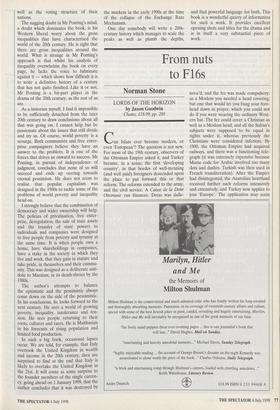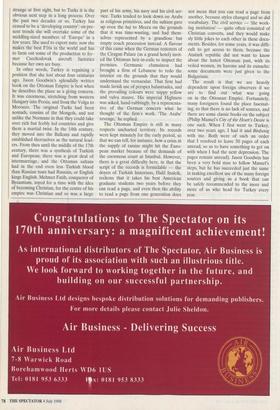From nuts to F16s
Norman Stone
LORDS OF THE HORIZON by Jason Goodwin Chatto, £18.99, pp. 288 Can Islam ever become modern, or even 'European'? The question is not new. For most of the 19th century, observers of the Ottoman Empire asked it, and Turkey became, in a sense, the first 'developing country', in that hordes of well-meaning (and well paid) foreigners descended upon the place to put forward this or that reform. The reforms extended to the army, and the civil service. A Caisse de la Dette Ottomane ran finances. Dress was dalla- turca'd, and the fez was made compulsory: as a Moslem you needed a head covering, but one that would let you bang your fore- head down in prayer, which you could not do if you were wearing the ordinary West- ern hat. The fez could cover a Christian as well as a Moslem head, and all the Sultan's subjects were supposed to be equal in rights under it, whereas previously the Christians were considered inferiors. By 1900, the Ottoman Empire had acquired railways, and there was a functioning tele- graph (it was extremely expensive because Morse code for Arabic involved too many dots and dashes. Turkish was then used in French transliteration). After the Empire had disintegrated, the Anatolian heartland received further such reforms intensively and extensively, and Turkey now applies to join 'Europe'. The application may seem strange at first sight, but to Turks it is the obvious next step in a long process. Over the past two decades or so, Turkey has ceased to be a 'developing country': on pre- sent trends she will overtake some of the middling-sized members of 'Europe' in a few years. She used to export nuts; now she makes the best F16s in the world and has to farm out some of the production to for- mer Czechoslovak aircraft factories because her own are busy.
In other words, Turkey is regaining a position that she lost about four centuries ago. Jason Goodwin's splendidly written book on the Ottoman Empire is best when he describes the place as a going concern. It was enormous, stretching from western Hungary into Persia, and from the Volga to Morocco. The original Turks had been nomads, cousins of the Mongols, and not unlike the Normans in that they could take over rich but feebly led countries and give them a martial twist. In the 14th century, they moved into the Balkans and rapidly established themselves as the natural lead- ers. From then until the middle of the 17th century, there was a synthesis of Turkish and European; there was a great deal of intermarriage, and the Ottoman sultans had in the end even less Turkish blood than Russian tsars had Russian, or English kings English. Mehmet Fatih, conqueror of Byzantium, toyed for a time with the idea of becoming Christian, for the centre of his empire was Christian and so was a large part of his army, his navy and his civil ser- vice. Turks tended to look down on Arabs as religious primitives, and the sultans gave up even the haj to Mecca on the grounds that it was time-wasting, and had them- selves represented by a grandiose but empty coach procession instead. A flavour of this came when the German restorers of the Ciragan Palace (as a grand hotel) invit- ed the Ottoman heir-in-exile to inspect the premises. Germanic clumsiness had brought a firm of Lebanese to redo the interior on the grounds that they would understand the vernacular. That firm had made lavish use of perspex balustrades, and the prevailing colours were nappy yellow and vulva mauve. His imperial Highness was asked, hand-rubbingly, by a representa- tive of the German concern what he thought of the firm's work. 'The Arabs' revenge,' he replied.
The Ottoman Empire is still in many respects uncharted territory. Its records were kept minutely for the early period, so that we can tell, for instance, how a crisis in the supply of raisins might hit the Euro- pean market because of the demands of the enormous court at Istanbul. However, there is a great difficulty here, in that the script of the records is formidable — the doyen of Ttirkish historians, Hafil Inalcik, reckons that it takes his best American graduate students two years before they can read a page, and even then the ability to read a page from one generation does not mean that you can read a page from another, because styles changed and so did vocabulary. The civil service — 'the work- ing institution' — quite often consisted of Christian converts, and they would make sly little jokes to each other in these docu- ments. Besides, for some years, it was diffi- cult to get access to them, because the Ataturk republic did not want to know about the hated Ottoman past, with its veiled women, its harems and its eunuchs: some documents were just given to the Bulgarians.
The result is that we are heavily dependent upon foreign observers if we are to find out what was going on in the Ottoman Empire. Fortunately, many foreigners found the place fascinat- ing, so that there is no lack of sources, and there are some classic books on the subject (Philip Mansel's City of the Heart's Desire is one such. When I first went to Turkey, over two years ago, I had it and .Birdsong with me. Both were of such an order that I resolved to leave 50 pages of each unread, so as to have something to get on with when I had the next depression. The pages remain unread). Jason Goodwin has been a very bold man to follow Mansel's steps, but he has succeeded just the same in making excellent use of the many foreign sources and giving us a book that can be safely recommended to the more and more of us who head for Turkey every year.















































































































 Previous page
Previous page